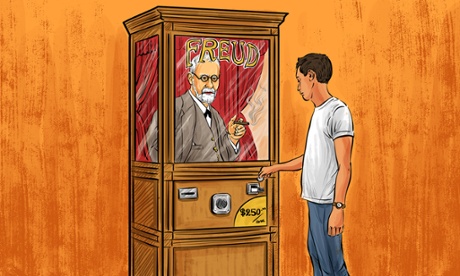
This is one of seven interviews with young professionals about their experiences with therapy and its costs. Read the rest here.
By the time Alex turned 18, he couldn’t remember a time when he hadn’t been on medication or in therapy.
As a depressed and anxious child, Alex worried his parents, who he says “like to throw money at problems”. When he was a teenager - based on the recommendation of an educational consultant - they sent him to a residential treatment center in Utah. Alex describes the 22 months that he spent at the center as a period of intense therapy.
At $6,000 a month, Alex’s stay at the center included room and board, “very bad meals”, schooling and therapy. “It was more expensive than a college education,” he says.
The fundamental nature of the economic transaction bothers Alex.
“For parents, it’s a strange thing because they want their kid fixed and shielded from evil, but presumably because it’s a thing you are buying, you want it done fast,” he says. “That’s the transaction: fix our kid and do it better and faster than the program down the street.”
The summer before he started college, Alex decided to find out what would happen if he stopped taking his medication and stopped going to his weekly sessions.
“I was curious,” he says. “Would it all fall apart?”
It didn’t.
“Everything was sort of the same,” he says. “It ended up being fairly OK, save for the occasional depressive episode.”
He decided he’d rather get through these episodes himself than engage in more therapy. Currently, Alex has been out of therapy for about 10 years.
“Maybe just because I am cheap, I’d rather be sad and keep the money than engage in [therapy],” he says. “For me, it means more to have a therapeutic conversation with a friend, who I know isn’t being paid to listen.”
He says he is probably never going back to therapy.

